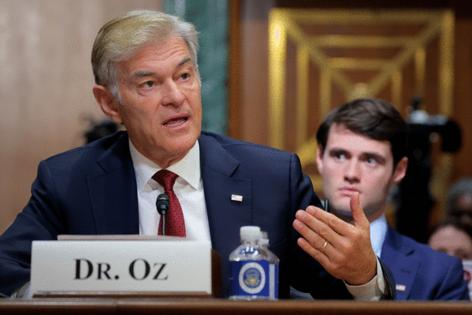Major insurers pledge to improve preauthorization
Published in News & Features
WASHINGTON — The nation’s largest insurers and insurance industry groups agreed to address problems caused by prior authorization, though Health and Human Services Department officials who announced the handshake deal on Monday acknowledged they may need to take additional regulatory action.
Health plans often require additional documentation before agreeing to cover some costly medications or treatments. Both the right and left have criticized its excessive use in denying or delaying needed treatment. Providers also say the practice limits their ability to decide what is best for their patients.
Secretary Robert F. Kennedy Jr. and Centers for Medicare and Medicaid Services Administrator Mehmet Oz said the insurer agreement came together after a roundtable with HHS and would apply to Medicare Advantage, Medicaid Managed Care, the Health Insurance Marketplace and commercial health plans.
The agreed-upon framework states that participating insurers should enhance transparency in prior authorization decisions and that medical professionals would review all coverage denials.
Insurers would also reduce the number of services subject to prior authorization requirements by Jan. 1, 2026, and ensure continuity for patients who are changing insurance plans.
Officials asked insurers to standardize their electronic prior authorization submissions through the Fast Healthcare Interoperability Resources application, an electronic data standard.
It also calls for implementing broader real-time responses for prior authorization approvals by 2027.
But CMS can’t enforce violations of the voluntary pledge, unlike a policy mandate crafted through rulemaking or via legislation.
“In reality, if the insurance industry cannot address the needs of preauthorization by themselves, there are government opportunities to get involved,” said Oz, speaking Monday at a news conference at HHS headquarters. “They might not be as nimble, but they will be used if we’re forced to use them.”
Oz said he hopes the framework will also save the government money by reducing the paperwork burden and time navigating unnecessary authorization reviews.
“The pledge is not a mandate. It’s not a bill or rule. This is not legislated. This is an opportunity for industry to show itself,” Oz said.
Sen. Roger Marshall, R-Kan., who spoke at the event, said Congress will still move in conjunction with the pledge.
“I do think that we owe it to our patients to go ahead and codify something,” Marshall said.
Chris Klomp, CMS’ Medicare director, said some of the services targeted for limiting prior authorization include colonoscopies, cataract surgeries and vaginal delivery for birth.
CMS will publish a full list of participating plans later this summer, Oz said.
Individuals from Aetna Inc., AHIP, Blue Cross Blue Shield Association, CareFirst BlueCross BlueShield, Centene Corporation, The Cigna Group, Elevance Health, GuideWell, Highmark Health, Humana Inc., Kaiser Permanente and UnitedHealthcare participated in the HHS roundtable.
Oz had pledged to address issues with prior authorization, including in Medicare Advantage, during his confirmation before the Senate.
“This issue of preauthorization is a pox on the system,” Oz told the Senate Finance Committee at the time.
The news conference also included surprise remarks from Eric Dane, the actor best known for playing Dr. Mark Sloan or “McSteamy” on TV medical drama “Grey’s Anatomy,” who previously announced he has ALS.
The pledge is not the industry’s first foray into reducing the burden of the prior authorization process. Insurers made commitments in 2018 and in 2023 that fell short of expectations.
“People lose their lives because of prior authorization,” Kennedy said. “In the past, the insurance industry has made commitments to prior authorization but they have not kept them. And in this case we think it’s very, very different.”
_____
©2025 CQ-Roll Call, Inc., All Rights Reserved. Visit cqrollcall.com. Distributed by Tribune Content Agency, LLC.







Comments